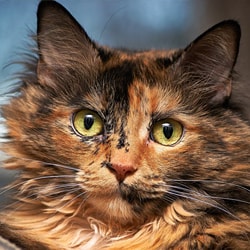SIGNS OF CAT’S AGING
Signs of cat’s aging. Age-related changes, diseases
Nowadays cats live much longer than their relatives in the old days. According to numerous reports, some cats, sometimes, live up to 30 years, but a common life span for a cat is approximately 15-16 years.
Gelded cats live much longer. Perhaps the reason for this lies in the fact that animal no longer «walks on it’s own», and therefore less prone to injuries and infections.
On average, cats of mixed breeds live longer than their purebred counterparts. But it’s just a statistic, and does not give any guarantees.
Cat’s body is unique, in some cases it can heal itself. For example a cat has two kidneys, but to be healthy and feel great — a fraction of one kidney is more than enough.
But years take their toll, and cats experience certain changes in their bodies with age.
 How to help your pet to cope with an old age?
How to help your pet to cope with an old age?
- First and most important — age-appropriate diet.
- The next important thing — grooming, as with age, this procedure become inaccessible for some cats.
Signs of cat’s aging. Age-related changes:
- Cat ceases to feel thirst, which can lead to dehydration.
- Cat’s body loses control over it’s temperature, which means that your pet will become less tolerable to the cold and heat.
- The cat begins to lose vision, taste, hearing and smell.
- Older cats are susceptible to infectious diseases, as well as the loss of teeth.
- With age, cat’s body decreases the secretion of saliva, which leads to poor swallowing.
- Some digestive problems can develop, caused by the inability of the stomach and intestines to digest food.
- Joint stiffness and arthritis.
- Skin abnormalities, hair loss, brittle claws.
- Reduced liver and kidney function.
- Increased risk of oncology diseases.
- The muscles lose their elasticity.
- The bones are weaken and become brittle.
- The cat’s blood pressure rises.
- Animals become susceptible to anemia.
- Less oxygen gets into the blood from the lungs, and therefore, the animal becomes tired very quickly after activities.
- The behavior is changing, related to the aging of the organism.
- Aging reduces the number of brain cells, resulting in slow response, partial loss of memory and poor orientation in space. Sometimes, the first sign of cat’s aging — loss of the ability to go to the toilet in the right place.